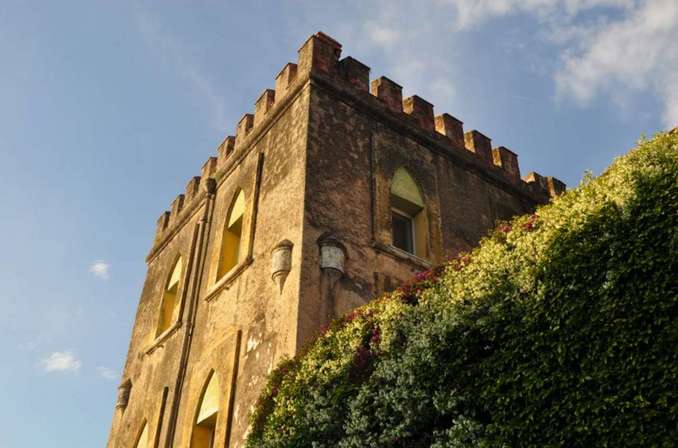
21 April 2017
Porta di Ferro Giardini
Porta di Ferro, not far from the Greek settlement Paestum, is on the fertile plain of the Sele river between the Amalfi and Cilento coasts. From the beginning of the 19th century to the present day, the land has been farmed.
In the past buffalo were reared for milk and the proprietors bred horses; this until the drainage of the swampy Sele Plain in the 1930's when the herds were substituted by plantations. A modern agricultural system of orchards was gradually developed, specializing today in the cultivation of kiwi fruit. The family house was built around the late 17th century “Torre Grimalda”, a hunting lodge of the Doria d'Angri family.
Lodgings, stables and coach houses, the dairy and bakery, the grain tower silos and the gardens all bear witness to the history of the property and its intensely rural and equestrian lifestyle over the centuries. Landscaping began on the property in the 20's with the planting of plane trees, cycas and palm trees from the Canary Islands. Further developments were made during the second half of the century when numerous different species were planted in the Twentieth Century Garden; Magnolia grandiflora, Araucaria excelsa,Pinus pinea, pomegranates, borders of hydrangeas, creeping bougainvilleas and shrubs. In recent years, the desire to develop a new and contemporary landscape has led to the development of the Kitchen Garden, the Garden at the Silos and the Experimental Garden, where water and ephemeral landscapes share the contemporary prospect. There is a certain continuity among the different areas of the gardens, as borders and lines of low shrubbery accompany the view, linking one prospect to another. This effect has been created by planting shrubs and grasses of different heights and robustness, both cultivated perennials and indigenous species. The different areas of the gardens have been landscaped in such a way as to enable the inclusion of other species so that Porta di Ferro Gardens will continue to evolve.
In the past buffalo were reared for milk and the proprietors bred horses; this until the drainage of the swampy Sele Plain in the 1930's when the herds were substituted by plantations. A modern agricultural system of orchards was gradually developed, specializing today in the cultivation of kiwi fruit. The family house was built around the late 17th century “Torre Grimalda”, a hunting lodge of the Doria d'Angri family.
Lodgings, stables and coach houses, the dairy and bakery, the grain tower silos and the gardens all bear witness to the history of the property and its intensely rural and equestrian lifestyle over the centuries. Landscaping began on the property in the 20's with the planting of plane trees, cycas and palm trees from the Canary Islands. Further developments were made during the second half of the century when numerous different species were planted in the Twentieth Century Garden; Magnolia grandiflora, Araucaria excelsa,Pinus pinea, pomegranates, borders of hydrangeas, creeping bougainvilleas and shrubs. In recent years, the desire to develop a new and contemporary landscape has led to the development of the Kitchen Garden, the Garden at the Silos and the Experimental Garden, where water and ephemeral landscapes share the contemporary prospect. There is a certain continuity among the different areas of the gardens, as borders and lines of low shrubbery accompany the view, linking one prospect to another. This effect has been created by planting shrubs and grasses of different heights and robustness, both cultivated perennials and indigenous species. The different areas of the gardens have been landscaped in such a way as to enable the inclusion of other species so that Porta di Ferro Gardens will continue to evolve.
The day the Lord created hope was probably the same day He created spring- Bern Williams - |






